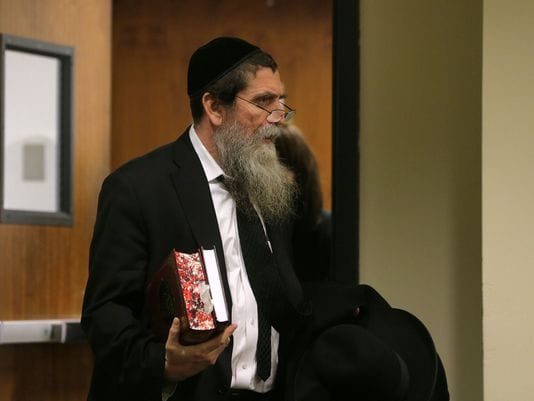An appellate court on Tuesday heard oral arguments in state prosecutors’ appeal of Judge Paone’s ruling to vacate Rabbi Osher Eisemann’s conviction based on exculpatory evidence that came to light only after his trial had concluded.
In July 2022, Judge Joseph Paone dismissed Rabbi Eisemann’s convictions, saying that the newly uncovered evidence could sufficiently impact a jury as to require a new trial. The evidence in question is the testimony of the bookkeeper who made the QuickBooks entry on which the state relied on to prosecute Rabbi Eisemann. After coming forward, the bookkeeper provided a sworn certification that the entry she had made was evidence of nothing, and was no more than a bookkeeping maneuver to balance SCHI’s books.
Furthermore, defense counsel showed that state prosecutors knew the identity of the bookkeeper but declined to interview her, and more importantly, withheld her identity from the defense, which thus had no opportunity to call her to the witness stand.
Following the dismissal of the convictions, the state appealed, arguing that Judge Paone should not have vacated them based on the newly acquired evidence.
In oral arguments Tuesday, the state asserted that Judge Paone had “no basis” to vacate Rabbi Eisemann’s convictions, insisting that the evidence showed he used an arm of SCHI to cycle $200,000 of SCHI’s money through various bank accounts before transferring that money back as repayment for a loan.
An appellate judge immediately interjected, noting that there was a dispute whether such a loan had ever occurred. This left the state’s attorney flummoxed for a moment before regaining her composure and responding that the QuickBooks entry – which the bookkeeper herself disputes – is evidence enough that such a loan existed.
Prosecutors astoundingly went on to claim that the new evidence is not exculpatory and should not warrant a new trial – an argument which the judges appeared to be skeptical of, with one saying that had the bookkeeper been a witness at the trial, it very well could have swayed the jury’s decision.
The state also defended its decision to hide the identity of the bookkeeper from the defense, arguing that prosecutors gleaned that information from SCHI’s own records, which Rabbi Eisemann’s defense had access to, and thus it wasn’t their responsibility. The judges didn’t appear taken by that argument either, with one asking why the state handed over other school records to the defense counsel if it wasn’t their responsibility, as they were now claiming.
The state prosecutor replied saying that the records withheld from the defense “do nothing” to help the defendant and so it didn’t matter whether they turned it over or not.
“That’s your perspective,” a judge shot back. “But shouldn’t the defendant have had the opportunity to review whether it was valuable to his defense strategy?”
The judge’s noted that Judge Paone didn’t accept this argument from the prosecution and ultimately vacated the conviction. The prosecution argued back that Paone’s vacancy shouldn’t stand because he didn’t preside over the original trial and thus he lacked the knowledge necessary to make a solid ruling. They also argued that Paone’s ruling was “riddled with errors,” pointing to an instance in which Paone said the QuickBooks entry was made by an “admin” rather than a bookkeeper – a weak argument if there ever was one.
Defense attorney Lee Vartan then rose to mount a furious rebuttal of the state’s arguments. Vartan pointed out that the entirety of the state’s prosecution of Rabbi Eisemann lay in their finding of the QuickBooks entry. To now argue that withholding information about that entry – specifically, who made the entry – doesn’t make a difference, makes a mockery of the legal proceedings, Vartan argued.
Vartan pointed to the bookkeeper’s certification, in which she stated in no unequivocal terms that the QuickBooks entry was made in a “dumping account” used to balance the books and had nothing to do with a loan taken out by Rabbi Eisemann. Such a loan, in fact, never existed.
The defense attorney then took a sledgehammer to prosecutors’ argument that they didn’t have to turn over the identity of the bookkeeper to the defense. Vartan said that well prior to the trial taking place, he served a written discovery demand to the state specifically asking for all of the QuickBooks reports it had in its possession.
The state responded to that discovery demand by providing the defense with a thumb drive of QuickBooks records – but declined to give them the identity of the bookkeeper, blatantly hiding key evidence from the defense. Had the defense turned that information over, the trial would have had a very different ending, Vartan argued.
“We asked specifically for this exculpatory evidence, and they didn’t provide it to us,” Vartan told the court.
“We’re not asking for this court to exonerate Osher Eisemann, to declare he’s innocent, but only that a second jury should be able to hear all of the admissible evidence,” Vartan told the panel of judges.
The judges concluded the oral argument session, saying that they would make their decision whether to uphold the dismissal of Rabbi Eisemann’s convictions within 30 days.

